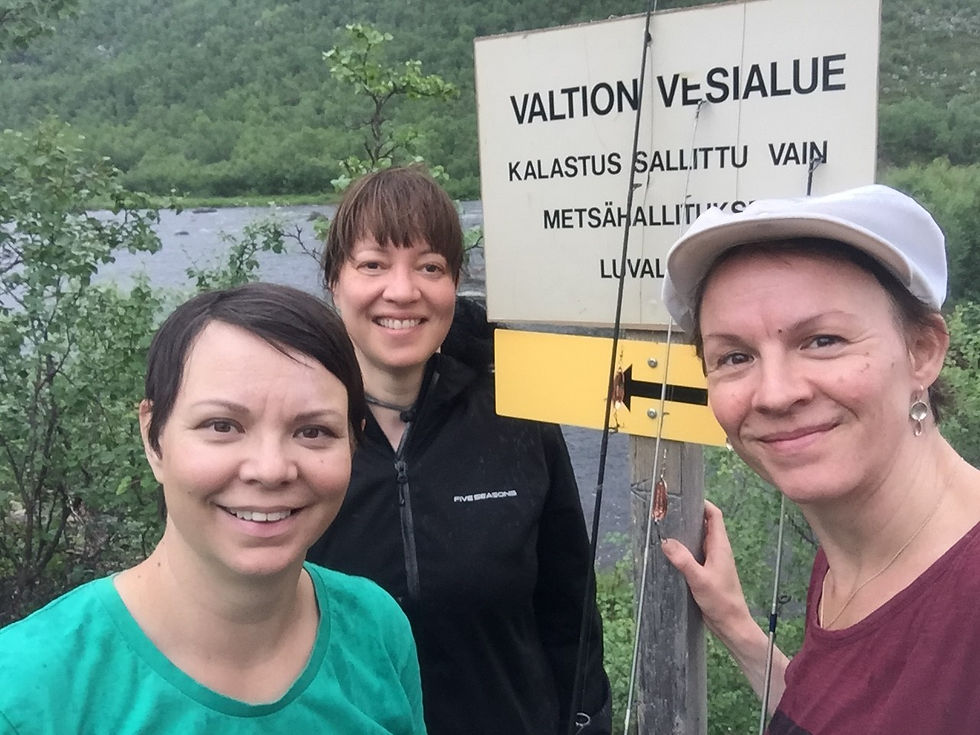Fishing Act - Reason for litigation
- samihumanrights
- 12.2.2019
- 3 min käytetty lukemiseen
Päivitetty: 13.2.2019
On Valentine’s Day, 14 February, instead of spending the day showing their appreciation for those they love four Sámi anglers will be in court in Utsjoki, Finland fighting for the rivers they love. On that day, a Finnish prosecutor will argue that they are criminals for fishing in the Vetsikko River without permission from Metsähallitus, the Finnish Forestry Company. Due to a 2015 amendment of the Finnish Fisheries Act the local Sámi people, who have been traditionally fishing the rivers of the Teno watershed for countless generations, were now forced to compete with recreational fishermen from elsewhere. This is not a Teno fishing rule, but arises from the amended Article 10 of the Fishing act which regulates who can fish in salmon and trout-rich waters in Teno tributatories.

The Finnish government had, until the amendments in 2015, respected the local Sámi people rights. In, Utsjoki and the surrounding areas, for example, the local people had a free fishing right upon the Teno tributaries, including in areas that are so called State-owned. Which was only reasonable considering the people in the area have been fishing in the same waters as countless generations before them.
In 2015, the law was amended so that Metsähallitus could sell day-to-day licenses for these waters to anyone who wanted to fish these waters and money enough to pay Metsähallitus. Only a limited number of licenses have been made available for sale in the early spring, where they sell out extremely quickly. Yet, even these licenses sold have increased fishing pressure compared to before.
This has had an oppressive effect on the local Sámi people who now have to compete for fishing licenses for their own waters with outsiders. It has had serious negative consequences in preserving the generations-old practices and ways of life of the local Sámi. They are now unable to fish according to the natural conditions of the river, such as water height and flow, weather, and fish movements, which has been practiced by the Sámi since time immemorial. Instead, it is expected that fishing can be planned months before the season. It has also become near impossible to pass down this collection of knowledge to the next generation because the Finnish government’s regulations now do not allow them to even cast a line with their children from their home beach on whim.
For the Sámi people, salmon fishing on home waters and small-scale sales have always been an important part of the culture and living in the area. Even the rich vocabulary of the Teno watershed, which is one of the strongest linguistic and cultural areas for the Sámi, reflect the central place fishing has within the community and the knowledge that is learnt and transmitted by fishing.
At the moment, the law could be restored to a more reasonable and respectful direction, but, among other things, the National Coalition Party member Markku Eestilä, with his supporters, opposes local Sámi rights. He interprets the issue in such a way that the law change would be linked to the modification of the Teno fishing regulations in order to increase fishing rights for non-local recreational fishermen who have purchased a property in the area. In this way attempting to extinguish the rights of the local Sámi people. Insultingly, they fly the false flag of equality and the protection of salmon when clearly acting in their own self-interest.
The Fishing Act is currently being discussed in Parliament. You can help contacting Finnish government and/or your national MP and asking them to amend the Fishing Act to take account of the rights of the Sámi to fish in their own waters.





Kommentit